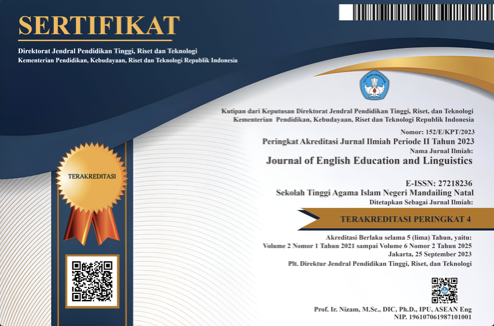REQUEST STRATEGIES IN STUDENTS’ REQUESTIVE EMAILS TO FACULTY: A PRAGMALINGUISTIC ANALYSIS OF POSTGRADUATE STUDENTS’ EMAILS
DOI:
https://doi.org/10.56874/jeel.v1i1.49Keywords:
Requestive email, pragmatic, direct strategies, pragmalinguistic.Abstract
The motivating basis of the study was generated from the fact that there is still little known about the research investigating request strategies in student’s requestive emails in Indonesian context in which the status of English is as a foreign language (EFL). This study intends to examine student’s pragmalinguistic competence realized in request strategies when emailing their lecturers as well as exploring their consideration in choosing certain linguistic means in their email. Case study was employed to get clear description of this particular case. Then, the CCARP framework was utilized to analyze 30 requestive emails composed by 15 students, and qualitative analysis was also applied to draw conclusion from student’s interview. The findings indicated that direct strategies such as mitigated imperative and want statements were mostly realized in more of student’s requestive emails. Moreover, social factors such as age, power, status, and distance become student’s reasons in choosing certain linguistic choices when emailing their lecturers. This present study finally offers some recommendations that can be applied in foreign language setting.
References
Abboodi Ali, S., & Pandian , A. (2016). Inappropriateness in Iraqi EFL Learners‟ E-mail Requests to Professor. IRA-International Journal of Education & Multidisciplinary Studies, 3(3), 402-417. doi:http://dx.doi.org/10.21013/jems.v3.n3.p13
Bassey, M. (1999). Case Study Research in Educational Setting . Buckingham: Open University Press.
Berg, B. L. (2001). Qualitative Research Methods for the Social Sciences. USA: Allyn & Bacon.
Best, W. J., & Kahn, J. V. (2006). Research in Education. Boston: Pearson Education Inc. (n.d.).
Biesenbach-Lucas, S. (2006). Making Requests in Email: Do Cyber-consultations Entail Directness? Toward Conventions in a New Medium. In K. Bardovi-Harlig, J. C. Félix- Brasdefer, & A. S. Omar, Pragmatics and Language Learning (pp. 81-108). Honolulu: Second Language Teaching and Curriculum Center, University of Hawai„i.
Biesenbach-Lucas , S. (2007). Students writing emails to faculty: An examination of E- politeness among native and non-native speakers of English. Language Learning & Technology, 11(2), 59-81. Retrieved from http://llt.msu.edu/vol11num2/biesenbachlucas/
Blum-Kulka, S., & Olshtain, E. (1984). Requests and apologies: A Cross-Cultural Study of Speech Act Realization Patterns (CCSARP). Applied linguistics, 5(3), 196-213.
Blum-Kulka, S., House, J., & Kasper, G. (1989). Investigating Cross-Cultural Pragmatics: An Introductory Overview. In S. Blum-Kulka, J. House, & G. Kasper, Cross-Cultural Pragmatics: Requests and Apologies (pp. 1-34). Norwood, NJ: Ablex.
Brown, P., & Levinson, S. (1987). Politeness: Some universals in language usage. Cambridge: Cambridge University Press .
Burgucu-Tazegül, A., Han, T., & Engin, A. O. (2016). Pragmatic Failure of Turkish EFL Learners in Request Emails to Their Professors. International Education Studies, 9(10), 105-115. doi: http://dx.doi.org/10.5539/ies.v9n10p105
Chang , Y.-Y., & Hsu , Y.-P. (1998). Requests on e-mail: A cross-cultural comparison. RELC Journal, 29(2), 121-151.
Chen, C. (2006). The development of e-mail literacy: from writing to peers to writing to authority figures. Language Learning and Technology, 10(2), 35-55.
Clark , H. H., & Schunk, D. H. (1980). Polite responses to polite requests. Cognition, 8(1), 111– 143.
Danielewicz-Betz, A. (2013). (Mis)use of Email in Student–Faculty Interaction: Implication for University Instruction in Germany, Saudi Arabia, and Japan. The JALT CALL Journal, 9(1), 23–57.
Economidou-Kogetsidis, M. (2011). „„Please answer me as soon as possible‟‟: Pragmatic failure in non-native speakers‟ e-mail requests to faculty. Journal of Pragmatics, 43, 3193–3215. doi:10.1016/j.pragma.2011.06.006
Economidou-Kogetsidis , M. (2015). Teaching Email Politeness in the EFL/ESL Classroom. ELT Journal Advance Access, 1-10. Retrieved from http://eltj.oxfordjournals.org/
Krulatz, A. (2015). Judgments of Politeness in Russian: How Non-Native Requests Are Perceived by Native Speakers. Intercultural Communication Studies, 20(1), 103-122.
Leech, G. (1983). Principles of Pragmatics. London: Longman.
Leech, G. (2014). The Pragmatics of Politeness. Oxford: Oxford University Press.
Shim , Y.-S. (2013). International faculty perceptions of requestive emails by Korean university students. Multimedia-Assisted Language Learning, 16(4), 111-131.
Thomas, J. (1983). Cross-cultural pragmatic failure. Applied Linguistics, 4, 91-112. Retrieved from http://dx.doi.org/10.1093/applin/4.2.91
Tseng , C.-T. H. (2015). “You Must Let Me Pass, Please!”: An Investigation of Email Request Strategies by Taiwanese EFL Learners. Journal of ELT and Applied Linguistics (JELTAL), 3(1), 11-28.
Wei-Hong Ko, S., Eslami, Z. R., & Burlbaw, L. M. (2015). Investigating Non-Native English Speaking Graduate Students‟ Pragmatic Development in Requestive Emails. International Journal of Society, Culture, and Language, 3(1), 1-15.
Zhu, W. (2012). Polite Requestive Strategies in Emails: An Investigation of Pragmatic Competence of Chinese EFL Learners. Regional Language Centre Journal, 43(2), 217– 238.
Downloads
Published
Issue
Section
License
All articles published in the Journal of English Education and Linguistics are licensed under a Creative Commons Attribution-ShareAlike 4.0 International (CC BY-SA) license. This means anyone is free to copy, transform, or redistribute articles for any lawful purpose in any medium, provided they give appropriate attribution to the original author(s) and Journal of English Education and Linguistics, link to the license, indicate if changes were made, and redistribute any derivative work under the same license.
Copyright on articles is retained by the respective author(s) without restrictions. A non-exclusive license is granted to the Journal of English Education and Linguistics to publish the article and identify itself as its original publisher, along with the commercial right to include the article in a hardcopy issue for sale to libraries and individuals.
Although the conditions of the Creative Commons Attribution-ShareAlike 4.0 International (CC BY-SA) license do not apply to authors (as the copyright holder of your article, you have no restrictions on your rights), by submitting to the Journal of English Education and Linguistics, authors recognize the rights of readers and must grant any third party the right to use their articles to the extent provided by the license.

This work is licensed under a Creative Commons Attribution-ShareAlike 4.0 International License.








